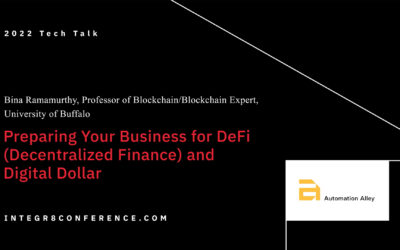Why Blockchain is Essential to the Manufacturing Supply Chain
Managing supply chains in the modern day is exceedingly complicated. According to shipping giant Maersk, a single shipment of refrigerated products from East Africa to Europe can include more than 200 interactions with approximately 30 people and organizations. Successful supply chain operations are contingent upon robust, transparent, and end-to-end communication across geographically dispersed partner ecosystems. Due to the complexity and lack of transparency inherent in today’s supply networks, the role of blockchain in supply chain management (SCM) is gaining traction. This blog examines five of the most compelling blockchain supply chain application use cases.
As per Forbes, the modern supply chain is broken. No longer a sequential chain from raw material to finished product, the current supply chain is a multi-tiered ecosystem of suppliers, partners, and customers cooperating much more closely. This is a cross-regional, cross-geographic, and increasingly cross-industry endeavor. Modern supply chains are straining under the weight of their complexity.
According to Forbes, the modern supply chain makes it extremely difficult for clients or buyers to understand the value of items due to a severe lack of transparency in our current system. Similarly, it is challenging to probe supply networks when suspected of unlawful or unethical practices. Additionally, they can be highly inefficient as vendors and suppliers attempt to connect the dots on who requires what, when, and how.
The contemporary supply chain cannot run effectively without visibility, transparency, and trust amongst thousands of players. Blockchain technology in the supply chain can address all these concerns. However, they are still in the early stages of development, and despite the potential benefits of blockchain, there are issues with blockchain in the supply chain.
Why are businesses incorporating blockchain technology into their supply chains?
To begin, let us define blockchain. A blockchain is a decentralized, distributed ledger technology. The ledger keeps track of transactions through the use of blocks that are sequentially linked together in a chain. The ledger is distributed across numerous computers, each of which is updated as the blockchain changes.
Due to how blockchain technology works, data included within a block cannot be altered, and tampering with blocks is nearly impossible. Any transaction has a single source of truth, and blockchain technology in supply chain management enables comprehensive verification and auditability of any transaction flow. This means that through the use of blockchain in the supply chain, businesses may develop trust in the accuracy and security of transactions—even when there is little or no trust established between the participants.
For instance, if a business collaborates with suppliers and logistic carriers located throughout the world, it will be able to track all parts and ensure their authenticity without relying on third parties and intermediaries. Blockchain technology enables firms to function in a near-zero-trust environment in supply chain management.
Not to reveal the supplier’s identity to specific client
If you do not wish to display a supplier, you can use a Decentralized Identity Digital (DID) signature on the supplier. This DID can then be supplied to a client who will be able to view the supplier. If the client does not possess this DID, the client will be unable to view the supplier. This DID can be generated via a smart contract.
The advantages of blockchain technology in the supply chain
Perhaps the most well-known implementation of Blockchain is Bitcoin. However, blockchain does not only create cryptocurrencies, its distributed ledger capabilities enable it to assist in the execution and monitoring of any transaction. The application of blockchain in the supply chain is motivated by reliability and integrity. Several distinguishing characteristics include the following:
Consensus
A transaction cannot be valid unless all parties agree. Without this unanimity, no new blocks are produced or alterations are made. This ensures that all stakeholders are aware when a change is being made and consent to it. Each entity in the chain agrees on the validity of each transaction. Blockchain technology may be used to achieve consensus across a broad range of supply chain transactions, including payment, warehouse management, transportation, and delivery.
Provenance
What is blockchain provenance and how does it apply to supply chains? Indeed, provenance is a critical component of the supply chain. Blockchain technology enables you to track the origins and movement of raw materials and goods across the supply chain. Provenance enables supply chain professionals to rapidly determine who possessed things and when. Provenance can be tied to any item in a supply chain, including iron ore, foodstuffs, money, machines, and even intellectual property.
Immutability
It is nearly impossible to alter with a distributed ledger entry. Each entry has many copies, all of which must be modified concurrently. Only a subsequent blockchain transaction can undo the prior one’s effect. Incorporating blockchain technology into the supply chain makes it impossible to falsify payment transactions, inventory records, warehousing conditions, and delivery times, among other things.
Finality
The shared ledger’s copies all contain the exact version of the truth. This fosters trust by providing all stakeholders with a unified view of the transaction. For supply chain management (SCM), blockchain offers a level of certainty that minimizes disagreements and enables the development of stronger relationships between all stakeholders.
Top 5 blockchain use cases for the supply chain
While blockchain instances in supply chain management are still scarce, a growing number of supply chain management use cases for blockchain are being studied, including the following:
- Supply chain in finance
Recently, there has been a surge of interest in blockchain and supply chain finance solutions due to their potential to boost invoice processing efficiency and deliver more transparent and secure transactions while also enhancing invoice processing efficiency. For instance, invoice payment terms are typically 30 days but are sometimes substantially longer. By merging supply chain finance and blockchain technology, you can implement smart contracts that trigger immediate payments upon delivery and signature of the product.
- Supply chain logistics
Friction is a significant issue in modern supply chains with numerous intermediaries and extensive back and forth between parties. As a result, suppliers, providers, and customers communicate through third-party entities rather than directly. According to DHL, the potential of blockchain technology in supply chain logistics is that transactions can be validated, documented, and coordinated autonomously, eliminating an entire layer of complexity from global supply networks.
- Supplier payments
According to American Express, “blockchain technology has the potential to enable fast, secure, and low-cost international payment processing services (and other transactions) via the use of encrypted distributed ledgers that provide trusted real-time verification of transactions without the need for intermediaries such as correspondent banks and clearing houses.” The coffee business is one application of the supply chain blockchain for supplier payment. Bext360 is leveraging blockchain technology to improve the tracking of all aspects of the global coffee trade, from farmer to consumer, thereby increasing supply chain productivity. By utilizing cryptocurrencies, this supply chain application of blockchain provides direct payment to farmers as soon as their products are sold.
- Cold chain traceability
Food and pharmaceutical products frequently have similar storage and transportation requirements. The combination of blockchain technology and IoT sensors on products enables the recording of temperature, humidity, vibration, and other environmental parameters. The data is kept on a blockchain, and smart contracts are used to ensure that any readings out of range are corrected automatically. Walmart’s unique use of blockchain technology to trace the source and quality of its pig products imported from China is an early example of blockchain in the food supply chain. Walmart now compels all spinach and lettuce suppliers to use blockchain due to the technology’s success in the supply chain.
- Food safety
Numerous food safety hazards, such as cross-contamination, are intractable and difficult to isolate. Due to a lack of data and insight into the supply chain, issues are addressed slowly, resulting in excessive waste and the economic and reputational costs associated with recalls. A consortium is implementing blockchain technology to track the movement and status of products across the supply chain. Companies such as Nestle, Walmart, and Unilever are leveraging blockchain technology to shorten the time required to identify and eliminate the cause of foodborne disease in the supply chain.
The requirement for a supply chain blockchain platform
A business’ success in deploying blockchain in the supply chain is contingent upon its solution delivering the required performance and scalability. With blockchain’s increasing technical maturity, supply chain development is likely to investigate ways to incorporate blockchain into operations where it makes the most sense. Transforming the supply chain industry will require blockchain systems to integrate trust and efficiency into a broad range of transactions.
Sources:
https://101blockchains.com/introduction-to-blockchain-features/
Haissam Badih PhD, is the Researcher and Professor at the Department of Math and Computer Science at the Lawrence Technological University, Southfield, Michigan, USA. He earned His B.S. degree in Computer Science from the University of Windsor at Ontario Canada, his M.S. Degree from Lawrence Technological University, and a Ph.D. in Computer Science and Informatics from Oakland University in 2020. He will begin his academic career at Lawrence Technological University in 2021. He has worked in various software companies in software engineering and architecture.He authored numerous journal and conference papers that were peer-reviewed. His current research and development interests and activities in Project DIAMOnD for Automation Alley in blockchain for building a 3D printer marketplace for the supply chain to support all kinds of business, including 4.0 Industry. This work on blockchain for autonomous systems design, sensor fusion, intelligent agents, automation, human/machine interaction, robotic programming, and interfacing/coding. His research dissertation, entitled "Advance and specialize our application of blockchain for webcam/microphone access control" and "Add Blockchain in A.I. for communication," has worked within research on the Blockchain and Decoy deception research project. He worked on blockchain and decoy deception using smart contracts. This project utilized a Blockchain application that enforces limited access to webcam and microphone devices. We utilize Blockchain's Smart Contract to form a contract between the user's computer and another party connected via a network.




